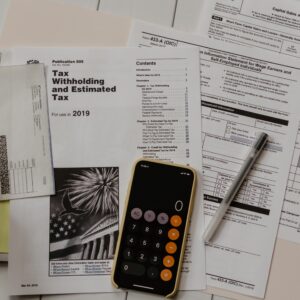
It is one of the scariest things that can befall a taxpayer – the dreaded notice from the IRS stating you owe them more money you can’t pay. When you open up the mailbox and see the return address of the tax agency staring back at you, your heart is bound to skip a beat (or two).
Few people look forward to communicating with the IRS, but plenty of taxpayers receive these notices every year. If you do find yourself on the receiving end of such a notice, knowing what to do next could make all the difference, and possibly save your bank account. Here are seven critical steps to take if the IRS disagrees with the income (or expense) figures you have reported.
Note: If you fall behind on filing your taxes, you’re not alone and we can help. Reach out to our tax resolution firm and we’ll help you file late tax returns and negotiate with the IRS if you owe back taxes. Get help from Ron Friedman, CPA.
- Stop panicking. Getting a letter from the IRS is enough to send your heart racing, but it is not the end of the world, and panic will not help you. Staying calm and reviewing the communication will be key, so settle your nerves and move on to the next steps.
- Review the document carefully. The letter you received from the IRS should clearly lay out where they disagree with your figures and what they used to come up with their own math. Reviewing these figures is the critical next step, and it is one you should take your time with.
- Pull a copy of the tax return in question. The communication you received from the IRS will tell you which year’s tax return is in question, so pulling a copy of that return should be your next step. Once you have the document in hand you can start to review the figures and see where the discrepancies came from.
- Find your supporting documents. In many cases these kinds of discrepancies are caused by simple errors like transposed numbers, so compare the figures on the supporting documents to what ended up on your return. You may find, for instance, that you reported interest of $2,150 as $1,250, and the solution could be as simple as ponying up the extra tax.
- Contact the best tax resolution firm. If you used a professional tax preparer, you might be tempted to talk to them first. That might be ok, but if you owe a large amount of back taxes, they might not be able to help. That’s where a good tax relief or tax resolution firm can help. The best tax relief firms can actually negotiate on your behalf with the IRS and find the best resolution for your tax situation, sometimes settling for less than what you owe in taxes!
- Review the response form. If you did make a mistake on your tax return, you can simply agree to the figures the IRS reported and pay the additional tax, along with any applicable penalties and interest. If you disagree, you can respond with the supporting documents that prove your case. Either way you will need to use the response form included with the letter, so review and complete that form carefully. We don’t suggest you do this yourself, instead, call our tax relief firm and make sure you investigate the issue in its entirety. Otherwise, you could land yourself in more trouble.
- Follow up. It can take some time for these kinds of discrepancies to be resolved, so you will need to bring a healthy dose of patience. If you agree with the notice and choose to pay the extra tax, you can see when your check is cashed or the money is taken out of your account, documenting the situation and keeping careful records. If you disagree, you will need to wait for the IRS to respond, but make sure you don’t assume the issue is resolved unless you have documentation stating that.
If you do need to contact the IRS, keep in mind that their phone lines are extremely busy. Many people who have been through this trauma recommend calling early in the morning, right after the phone lines open, so you can get in line and get your questions answer before the lines fill up.
We NEVER suggest our clients try to contact the IRS on their own. It would be like going to court without a lawyer. The IRS is not your friend, they’re sole responsibility in these cases is to collect taxes they think they’re owed.
Hopefully you will never be on the receiving end of a nasty letter from the IRS but it is still important to be prepared. If you do find a letter from the IRS in your mailbox, following the seven critical steps listed above could save you from further trouble. Reach out to our tax resolution firm and we’ll schedule a free, no-obligation confidential consultation to explain your options in full to permanently resolve your tax problem. Get help from Ron Friedman, CPA.
